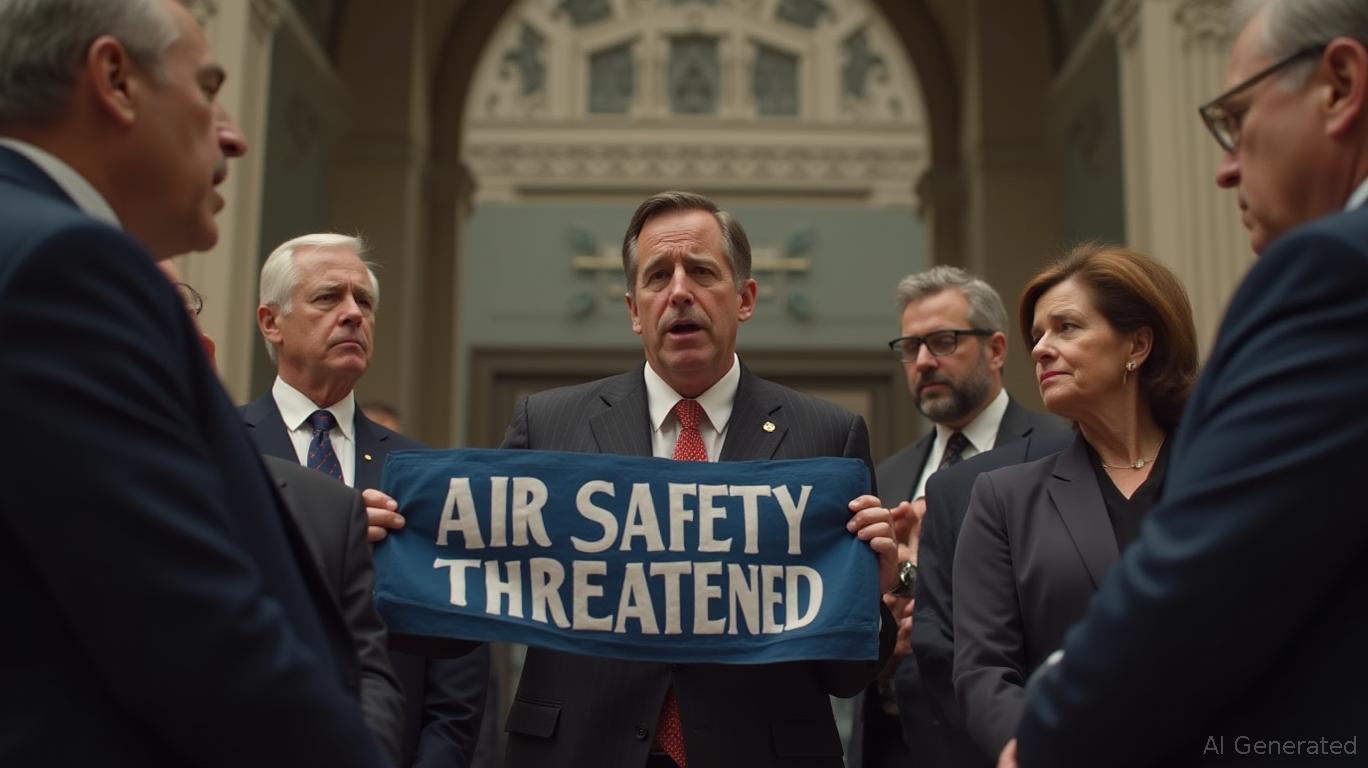Political Stalemate Puts Aviation Safety at Risk as Shutdown Reaches Day 30
- Major U.S. airlines urge Congress to end the 30-day government shutdown, citing risks to air safety and holiday travel amid unpaid staff shortages. - Air traffic controllers face mandatory overtime without pay, worsening delays at key airports and eroding safety focus, per FAA and union reports. - Political gridlock blocks funding bills, with Democrats demanding extended healthcare subsidies and Republicans failing to secure 60 Senate votes for a resolution. - Economic costs reach $7B for a four-week shu
United and
The Federal Aviation Administration (FAA) has attributed delays at major airports such as Boston, Dallas, and Orlando to staffing shortages, with some delays stretching up to four hours, as reported by

The economic consequences are growing. The Congressional Budget Office (CBO) projected that a shutdown lasting four weeks could reduce economic output by at least $7 billion by the end of the year, and that figure could double to $14 billion if the shutdown extends to eight weeks. Airlines, however, argue that the toll on people and operations is even greater.
The political stalemate remains unresolved. Democrats have declined to back temporary funding unless Republicans agree to prolong enhanced Affordable Care Act subsidies, which impact 22 million people, CNBC reported. Senate Republicans, who hold 53 seats, have not managed to reach the 60-vote threshold needed to pass a funding bill, with 13 failed attempts since the shutdown began, according to
Public anxiety is mounting as well.
As the shutdown approaches the 35-day record set in 2018-2019, airline industry groups and unions are warning of a breaking point. "Missing paychecks only heightens the strain on these vital employees,"
Disclaimer: The content of this article solely reflects the author's opinion and does not represent the platform in any capacity. This article is not intended to serve as a reference for making investment decisions.
You may also like
BAT drops 1.05% over 24 hours as Bangladesh faces declining sales and operational difficulties
- British American Tobacco (BAT) fell 1.05% on Nov 2 2025, despite 13.71% weekly and 16.58% monthly gains, amid a 18.77% annual decline. - Bangladesh operations drove a 23% YoY profit drop due to 18% sales decline, 15% higher operating costs, and Tk 2.12B relocation expenses. - Elevated excise duties (14% rise), finance costs (21% increase), and negative cash flow (-Tk 21.70/share) exacerbated financial strains despite 300% dividend boost. - Net asset value per share fell to Tk 105.22, reflecting long-term
ALGO falls by 1.04% as annual decline reaches 46.64%, reflecting poor technical indicators and ongoing market instability
- ALGO fell 46.64% annually by Nov 2025, with 3.2% 7-day decline amid weak technical indicators and macroeconomic uncertainty. - Token remains below 50/200-day moving averages, with RSI in neutral and MACD negative, reinforcing bearish sentiment. - Historical backtests show 21% win rate for short-term recovery attempts, with passive holding (-0.9%) outperforming active trades (-11.3%). - Analysts warn of deeper corrections if key levels break, as crypto market risk-off tone exacerbates ALGO's vulnerability
LUNA Drops 77.43% Over the Past Year as Market Volatility Persists
- LUNA plummeted 0.95% in 24 hours, with a 77.43% annual decline amid market uncertainty. - Analysts cite regulatory scrutiny, macroeconomic pressures, and waning institutional interest as key drivers of its bearish trend. - Short-term resilience contrasts with long-term challenges, as traders monitor technical levels for potential reversals. - Backtested strategies using 10% volatility thresholds aim to assess profitability amid LUNA's erratic price behavior.
Elon Musk would like you to be aware that Sam Altman received his money back for the Tesla Roadster